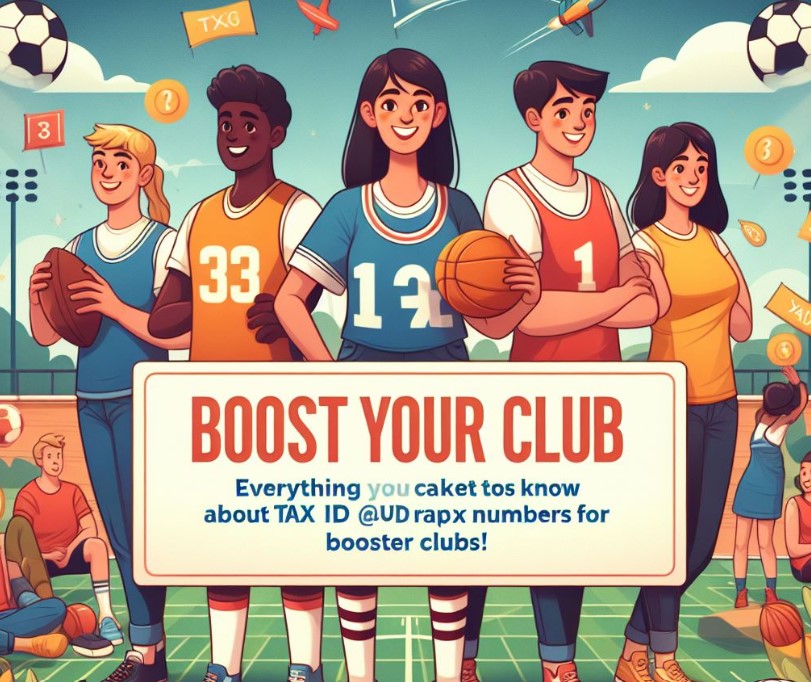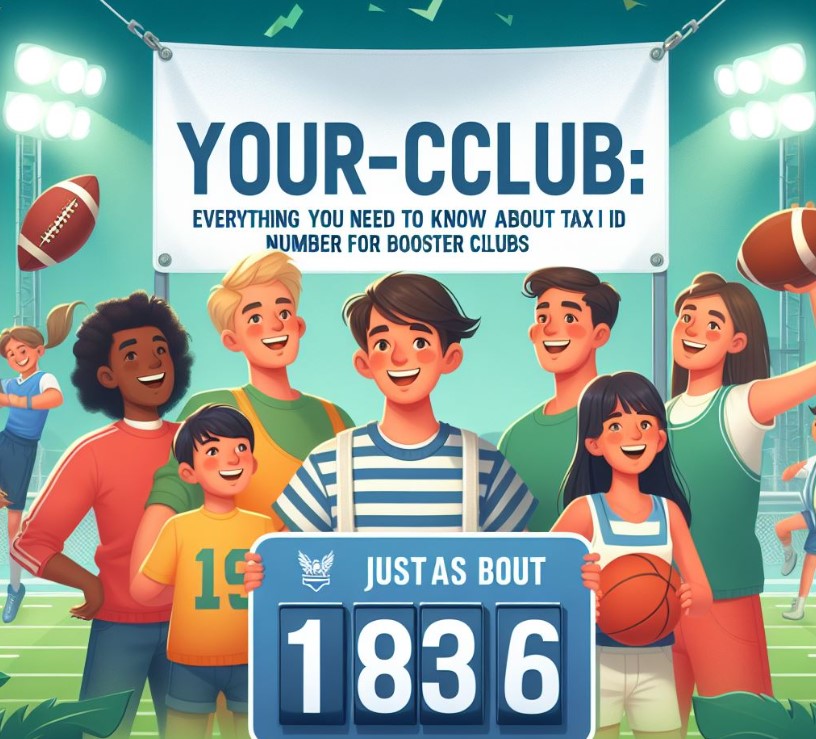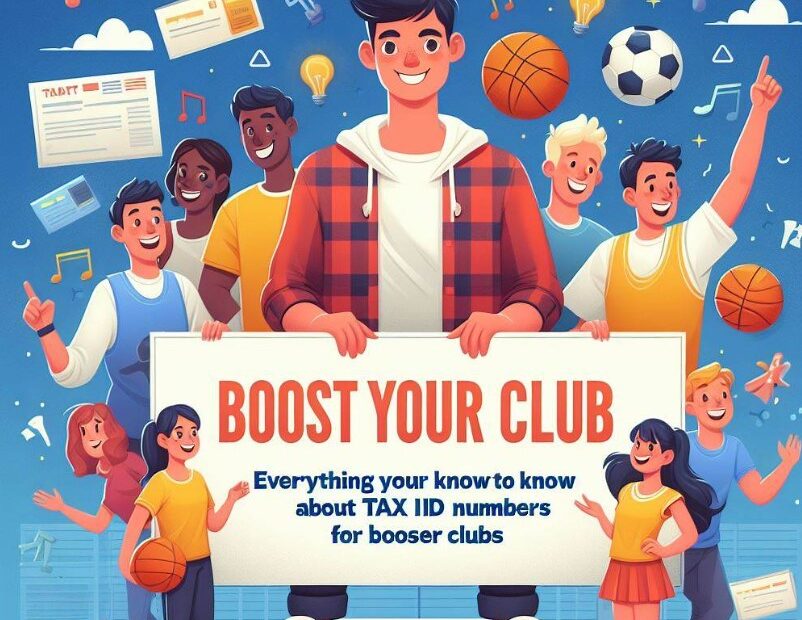This article will explain Do Booster Clubs Need A Tax Id Number? This question often surfaces as these organizations strive to align with legal and financial requirements. Understanding the intricacies of tax identification for booster clubs is crucial for their effective operation and compliance with tax laws.
Key Takeaways
- Tax ID Requirement: Most booster clubs require a tax ID number for legal and financial operations.
- Type of Tax ID: Clubs typically need an Employer Identification Number (EIN) from the IRS.
- Purpose of Tax ID: The ID is essential for bank accounts, tax filings, and legal activities.
- Compliance with IRS: Obtaining and using a tax ID ensures compliance with IRS regulations.
- State Regulations: State-specific rules may also apply to booster clubs.
Do Booster Clubs Need A Tax Id Number?
Yes, booster clubs generally need a tax identification number. Specifically, an Employer Identification Number (EIN) is often required. This number is necessary for various functions, such as opening bank accounts, filing tax returns, and conducting other formal business activities. Ensuring the acquisition of this number is a vital step in establishing and maintaining a legally compliant booster club.

Why is a Tax ID Necessary?
- Banking Requirements: Banks typically require an EIN to open an account.
- Tax Filing: Clubs need to file federal and state taxes, for which an EIN is necessary.
- Legal Identity: An EIN provides a unique identifier for legal activities.
Legal Implications of Having an EIN
Compliance with IRS Regulations
Booster clubs must adhere to IRS regulations, and having an EIN is a fundamental part of this compliance. This number ensures that the club is recognized as a distinct entity for tax purposes.
Maintaining Tax-Exempt Status
For clubs with 501(c)(3) status, maintaining this status is crucial. An EIN is integral to this process, as it is used in all dealings with the IRS and state tax authorities.
Financial Management in Booster Clubs
Importance of Accurate Financial Records
Keeping meticulous financial records is essential for booster clubs. An EIN helps streamline financial management and reporting, ensuring transparency and accountability.
Role of Tax ID in Fundraising
Fundraising is a core activity of booster clubs. A tax ID number is often required to conduct fundraising legally and effectively, especially when dealing with large donations or corporate sponsors.
State-Specific Tax ID Requirements

Varying Requirements Across States
Booster clubs must also be aware of state-specific tax requirements. While the EIN is a federal requirement, additional state-specific IDs might be needed.
Understanding and navigating state tax laws is crucial for booster clubs to avoid legal complications and penalties.
Operational Benefits of Having a Tax ID
Simplifying Transactions
Having a tax ID simplifies various transactions, including vendor relations and grant applications.
Enhancing Credibility
A tax ID adds a level of professionalism and credibility to the booster club, which can aid in fundraising and community engagement.
Establishing a Tax ID for New Booster Clubs
When forming a new booster club, obtaining a tax ID number is one of the first steps. The process involves applying to the Internal Revenue Service (IRS) for an Employer Identification Number (EIN). This is crucial for separating the club’s financial activities from those of the individuals involved.
Application Process
- Online Application: The fastest way to apply for an EIN is through the IRS website. This method is efficient and provides immediate EIN assignment.
- Form SS-4: For those who prefer traditional methods, Form SS-4 can be mailed or faxed to the IRS. This process takes longer, but it’s an alternative for those without internet access.
Post-Application Steps
- Record Keeping: Once a tax ID is obtained, it’s important to keep this information secure yet accessible for official use.
- Notification: Informing bank institutions and relevant parties about the EIN is necessary to update records and ensure smooth financial operations.
Renewal and Verification of EIN
Regularly verifying and updating the booster club’s EIN information is important. While EINs do not expire, ensuring that the club’s information with the IRS is current is crucial, especially after any significant changes in the club’s structure or management.

Verification Process
- IRS Correspondence: Regular communication with the IRS ensures the EIN is active and the club’s information is up-to-date.
- Online Verification Tools: The IRS provides tools for EIN verification, which are particularly useful in confirming the legitimacy of the tax ID for external parties.
Updating EIN Information
- Changes in Structure: If there are significant changes in the club’s structure, such as a change in officers or legal name, updating the IRS with this information is necessary.
- Annual Reporting: Annual tax filings are a good opportunity to verify and update any changes related to the EIN.
Tax Reporting Obligations for Booster Clubs
Booster clubs with a tax ID number are obligated to file annual tax returns with the IRS. This is critical for maintaining their tax-exempt status and ensuring transparency in their financial operations.
Federal Tax Filing
- Form 990 Series: Depending on their revenue, booster clubs may need to file one of the 990 series forms (990-N, 990-EZ, or 990).
- Deadlines and Penalties: Being aware of filing deadlines and potential penalties for late submissions is important for maintaining good standing with the IRS.
State Tax Filing
- State Requirements: Some states may have additional filing requirements for booster clubs. These can vary significantly and should be researched thoroughly.
- Local Compliance: Compliance with local tax laws is just as crucial as federal compliance to avoid fines and legal issues.
Handling Donations and Contributions
Managing donations effectively is vital for booster clubs. With a tax ID, clubs can offer donors tax deductions for their contributions, which can be a significant incentive for potential donors.

Tracking Donations
- Receipts and Records: Issuing receipts for donations and keeping detailed records is essential for both the club and the donors, especially for tax purposes.
- Transparency: Maintaining transparency about how donations are used builds trust with donors and the community.
Tax Deductibility
- 501(c)(3) Status: If the club is a 501(c)(3) organization, donations are typically tax-deductible for donors.
- Communicating with Donors: Communicating the tax benefits to potential donors can aid in fundraising efforts.
Beyond Tax IDs: Additional Legal Considerations
While having a tax ID is crucial, booster clubs must also be aware of other legal considerations to operate effectively and legally.
Insurance and Liability
- Liability Insurance: Obtaining liability insurance can protect the club and its members from potential legal issues.
- Risk Management: Understanding and managing risks associated with club activities is essential for long-term sustainability.
Compliance with School Policies
- Alignment with School Rules: If the booster club is associated with a school, ensuring alignment with the school’s policies and regulations is critical.
- Partnership with School Administration: Building a strong relationship with school administrators can facilitate smoother operations and greater support.
Conclusion
For booster clubs, obtaining and maintaining a tax ID number is not just a legal necessity but a cornerstone of efficient and responsible operation. It ensures compliance with IRS and state regulations, aids in financial management, and enhances the club’s credibility. So, Do booster clubs need a tax ID number? Absolutely, and it’s a key component of their success and sustainability.
Frequently Asked Questions
Can a booster club lose its tax-exempt status?
Yes, a booster club can lose its tax-exempt status if it fails to adhere to the compliance requirements, such as not filing the necessary tax returns for three consecutive years, or engaging in activities not aligned with its exempt purpose.
What records should a booster club keep for tax purposes?
A booster club should maintain detailed financial records, including bank statements, receipts, invoices, donation records, and records of expenditures. These are necessary for accurate tax filing and financial transparency.
Are booster clubs required to file tax returns?
Yes, most booster clubs with an EIN are required to file annual tax returns using one of the IRS Form 990 series, even if they have tax-exempt status. The specific form depends on the club’s annual gross receipts.
How often does a booster club need to renew its EIN?
An EIN does not require renewal; it is valid as long as the club is in operation. However, the club should update its information with the IRS if there are significant changes like a name change or a change in board members.
A multifaceted professional, Muhammad Daim seamlessly blends his expertise as an accountant at a local agency with his prowess in digital marketing. With a keen eye for financial details and a modern approach to online strategies, Daim offers invaluable financial advice rooted in years of experience. His unique combination of skills positions him at the intersection of traditional finance and the evolving digital landscape, making him a sought-after expert in both domains. Whether it’s navigating the intricacies of financial statements or crafting impactful digital marketing campaigns, Daim’s holistic approach ensures that his clients receive comprehensive solutions tailored to their needs.








